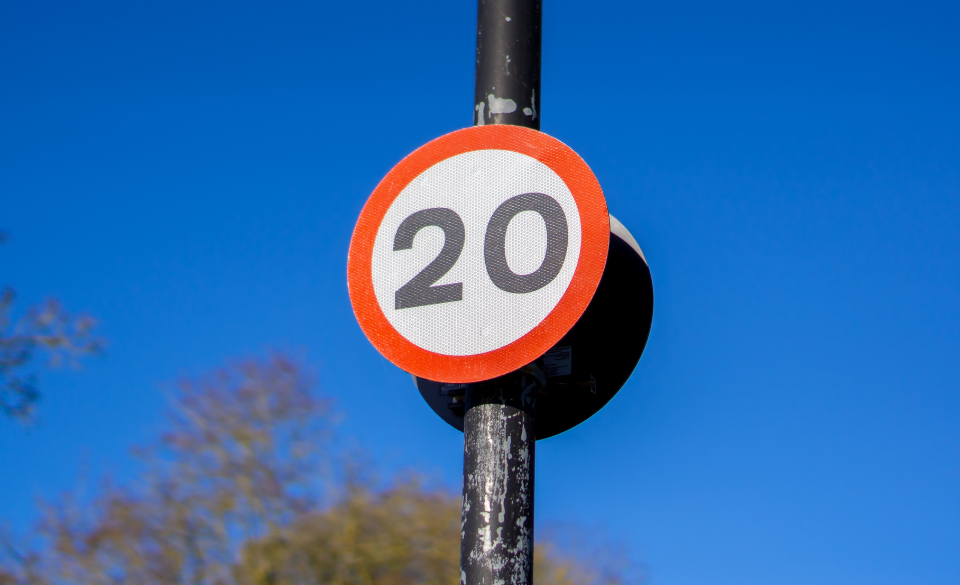The new 20mph speed limits introduced on a number of UK roads have received a mixed response from motorists and safety experts. Controversial suggestions to make 20mph, rather than 30mph, the default speed limit in built-up areas have attracted increased media attention, with the public divided on whether this has any benefits.

© Nigel A Messenger / Shutterstock.com
Several studies have been carried out into whether the 20mph zone idea is helping to reduce traffic accidents, or whether it’s simply causing frustration among drivers. The surveys have received different reactions, depending on the demographic polled.
We’re taking a look at whether “Life’s Better at 20mph” - the name of a new campaign by Cornwall Council to promote the advantages of a lower speed limit. The road safety charity Brake is also calling for a blanket 20mph default in urban areas.
Despite data suggesting injuries as a result of traffic accidents have fallen by one-third on roads with a 20mph limit, a public backlash has led to an online petition against the proposal receiving almost half a million signatures.
Why have 20mph roads become a big deal?
Wales became the first of the home nations to introduce a default 20mph speed limit on 17th September 2023, after new legislation was passed by the Welsh government in July 2022. Local councils can make discretionary exceptions to the new limit, but it is mandatory outside schools.
Transport for London says there have been road safety improvements since the introduction of 20mph speed limits in the capital. Accidents resulting in serious injuries or death have reduced by 25% in the Congestion Charging Zone in central London.
A plan by Cornwall Council to roll out 20mph zones in St Austell and other areas of the county will impact the majority of residential routes. The council says it has received “strong local support” for the initiative, with a public consultation just having finished on 13th September.
Wirral Council is also set to introduce more 20mph zones on all residential streets over the next four years and a consultation is ongoing to gauge residents’ views.
Scottish ministers have committed to putting a 20mph standard speed limit in place across all councils by 2025, while many local authorities in England including Tonbridge, Norwich and Chichester have already lowered the speed in residential areas.
An estimated 28 million people in the UK currently live in 20mph zones, from London to Lancashire and the Scottish Highlands, according to the 20’s Plenty For Us non-profit organisation. A total of 63 local authorities in England alone have introduced the scheme in built-up areas.
Only the Highway Authority of Northern Ireland hasn’t made a blanket commitment to the initiative yet, although some roads in Belfast City Centre and around 112 schools have adopted the lower limit.
What are the benefits of 20mph zones?
The major benefit cited by supporters is fewer casualties and less severe collisions at 20mph. Pedestrian fatalities are up to five times higher when vehicles are travelling at 30mph to 40mph, compared with speeds of 20mph to 29mph.
A study carried out in Bristol revealed fatalities in 20mph speed limit zones had been reduced by 63%, while Transport for London said the scheme had reduced the overall severity and frequency of injury accidents.
Pro-campaigners also say there’s less noise pollution when traffic is moving slower and it gives pedestrians a better chance of crossing the road safely, especially elderly and less mobile people.
Environmental campaigners say 20mph speed limits can help reduce pollution, and it’s also safer for cyclists.
Why do people object to 20mph zones?
People against lowering the speed limit say the early findings are inconclusive and feel it will take many years of collision data to create an accurate picture of any advantages.
In Cornwall and Wales, critics say the lower speed limit has made zero difference, as many drivers are ignoring it anyway. They claim all it does is ensure more drivers are given a fine for speeding.
Locals have been vociferous in their dislike of the new speed limit, describing it as a “complete waste of time and money” because it leads to “queues and stationary traffic causing more pollution”. They are calling for a “common sense” approach, with 20mph zones imposed outside schools and around pedestrian crossings, but leaving the existing limit in place elsewhere, except with improved policing.
Surveys have revealed 81% of cyclists and 29% of motorcyclists are in favour of lowering the speed limit, but only 23% of car drivers in southern England support the move. However, 54% of drivers would like the road outside their own home reduced to 20mph.
In Wales, a poll of drivers has found just 8% support the blanket 20mph limit and 33% say it will increase the likelihood that they will walk more often, which some campaigners see as a positive.
Nationwide, a poll in 2018 found 75% of residents living in 20mph areas supported the limits. However, since roads where there’s a 20mph sign have experienced a speed reduction of only 1%, there’s now less support and more people feel it’s a waste of time.
How much is a speeding fine?
Motorists caught speeding in the UK will face a minimum three penalty points on their driver’s licence and a fine of £100. They may receive more points and a higher fine, depending on how fast they were going.
A speeding offence is classed as category A, B or C and in the most serious cases, a driving disqualification can be imposed, with a fine of up to £1,000 - or £2,500 if the offence occurred on a motorway.
A fixed penalty notice is issued for the less serious offences, when the driver doesn’t need to attend a court hearing.
The police are enforcing the 20mph speed limits by using fixed cameras, other speed monitoring equipment that calculates a vehicle’s average speed along a measured stretch of road and mobile speed check devices operated by roadside traffic police.

